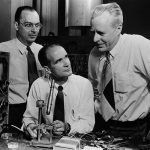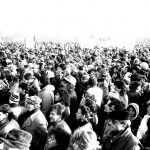 1947 – American scientists John Bardeen and Walter Houser Brattain observe the basic principles of the transistor, a key element in the electronic revolution of the 20th century. The transistor revolutionized the electronics industry, enabling the development of almost every modern, electronic device, from telephones to computers. This element became indispensable, using in the information age. Bardeen and Bratain won the Nobel Prize in Physics in 1956 for this invention.
1947 – American scientists John Bardeen and Walter Houser Brattain observe the basic principles of the transistor, a key element in the electronic revolution of the 20th century. The transistor revolutionized the electronics industry, enabling the development of almost every modern, electronic device, from telephones to computers. This element became indispensable, using in the information age. Bardeen and Bratain won the Nobel Prize in Physics in 1956 for this invention.
 1950 – In the Tibet Autonomous Region of southwest China, Lhamo Dondrub is formally named the 14th Dalai Lama. Lama, is internationally recognized as the last spiritual leader of this Tibetan dynasty. And this after the People’s Republic of China, in 1950 militarily invaded, the capital of Tibet, Lhasa. Beginning in the late 1950s, the Dalai Lama emigrated to India, and then to the United States, where over the years he developed widespread support for the autonomy of the Tibetan region.
1950 – In the Tibet Autonomous Region of southwest China, Lhamo Dondrub is formally named the 14th Dalai Lama. Lama, is internationally recognized as the last spiritual leader of this Tibetan dynasty. And this after the People’s Republic of China, in 1950 militarily invaded, the capital of Tibet, Lhasa. Beginning in the late 1950s, the Dalai Lama emigrated to India, and then to the United States, where over the years he developed widespread support for the autonomy of the Tibetan region.
 1966 – Sophie Marceau is born in Paris. Marceau, is a French actress, director, and screenwriter. She achieved popularity with her first films La Boum and La Boum 2, receiving a César Award for Most Promising Actress. Sophie, became a movie star in Europe with a range of successful performances, including L’Étudiante, Pacific Palisades, Fanfan and Revenge of the Musketeers. Marceau also stood out internationally with her appearances on Braveheart, Firelight and James Bond’s 19th film, The World is Not Enough.
1966 – Sophie Marceau is born in Paris. Marceau, is a French actress, director, and screenwriter. She achieved popularity with her first films La Boum and La Boum 2, receiving a César Award for Most Promising Actress. Sophie, became a movie star in Europe with a range of successful performances, including L’Étudiante, Pacific Palisades, Fanfan and Revenge of the Musketeers. Marceau also stood out internationally with her appearances on Braveheart, Firelight and James Bond’s 19th film, The World is Not Enough.
 1989 – In Czechoslovakia, the so-called Velvet Revolution officially begins. This revolution led by the future Czech leader, the writer Vaclav Havel, aimed at overthrowing the communist government of Prague, loyal to Moscow. This revolution would last almost 2 months, and finally, it would achieve its goal by overthrowing the 48-year-old communist regime in this country. The Velvet Revolution would be peaceful, and there would be no casualties during its development.
1989 – In Czechoslovakia, the so-called Velvet Revolution officially begins. This revolution led by the future Czech leader, the writer Vaclav Havel, aimed at overthrowing the communist government of Prague, loyal to Moscow. This revolution would last almost 2 months, and finally, it would achieve its goal by overthrowing the 48-year-old communist regime in this country. The Velvet Revolution would be peaceful, and there would be no casualties during its development.
 1997 – In Luxor, Egypt, 62 people are killed by six Islamic militants outside the Hatshepsut Temple, known as the Luxor Massacre. Most of those killed by Egyptian terrorists were tourists who were there to visit the ancient temple complex. The country with the highest death toll was Switzerland, followed by Japan and the United Kingdom. This attack was carried out by the Jamah al Islamyyia Organization. But years later the same organization denied having any influence on these killings.
1997 – In Luxor, Egypt, 62 people are killed by six Islamic militants outside the Hatshepsut Temple, known as the Luxor Massacre. Most of those killed by Egyptian terrorists were tourists who were there to visit the ancient temple complex. The country with the highest death toll was Switzerland, followed by Japan and the United Kingdom. This attack was carried out by the Jamah al Islamyyia Organization. But years later the same organization denied having any influence on these killings.
 2000 – In Peru, Alberto Fujimori is ousted as President of this country. Fujimori ended his presidency by fleeing Peru to his country of origin, Japan amid a major scandal involving corruption and human rights abuses. Even after his prosecution in 2008 for crimes against humanity related to governance, two-thirds of Peruvians surveyed expressed approval of Fujimori’s leadership at the time.
2000 – In Peru, Alberto Fujimori is ousted as President of this country. Fujimori ended his presidency by fleeing Peru to his country of origin, Japan amid a major scandal involving corruption and human rights abuses. Even after his prosecution in 2008 for crimes against humanity related to governance, two-thirds of Peruvians surveyed expressed approval of Fujimori’s leadership at the time.
 2006 – Ferenc Puskas dies in Budapest at the age of 79. Puskas, was a footballer and Hungarian, widely regarded as one of the greatest players of all time. A prolific striker, he scored 85 goals in as many international matches for Hungary, played 4 international matches for Spain and scored 514 goals in 529 matches in Hungary and Spain. He became an Olympic champion in 1952 and took his place in the 1954 World Cup final, where he was named best player. Puskas won three European Cups, 10 national championships, as well as 8 best individual awards. In 1995, he was recognized as the top scorer of the 20th century.
2006 – Ferenc Puskas dies in Budapest at the age of 79. Puskas, was a footballer and Hungarian, widely regarded as one of the greatest players of all time. A prolific striker, he scored 85 goals in as many international matches for Hungary, played 4 international matches for Spain and scored 514 goals in 529 matches in Hungary and Spain. He became an Olympic champion in 1952 and took his place in the 1954 World Cup final, where he was named best player. Puskas won three European Cups, 10 national championships, as well as 8 best individual awards. In 1995, he was recognized as the top scorer of the 20th century.






